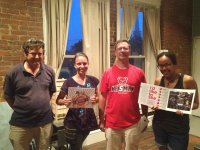‘Walk Your Block’ is Jefferson County's next Smoketown initiative

A year after the Vision Smoketown survey report was released, largely the same Jefferson County Economic Justice team is putting together a report on the Smoketown Walk Your Block project launched in April 2015. The report will summarize a sidewalk and street inventory created to accesses the walkability (how likely people are to walk an area), infrastructure needs and housing conditions of the Smoketown neighborhood.
This report is a first step toward a growing interest by economic justice committee members in understanding what democracy looks like at the neighborhood level.
A general lesson from the Vision Smoketown work was that Smoketown is a neighborhood with an unequal access to city resources allocated to maintaining streets, supporting business development and supporting reuse of vacant housing stock. Smoketown residents’ unequal connection to city decision-makers may be why the more affluent Highlands neighborhood thrives with the support of city resources.
Walk Your Block brought the difference in infrastructure into clear focus. Cracks and shifts in sidewalks have to be raised at least 8 inches higher than the remainder of the sidewalk for the the city to repair. A city-produced smartphone app to report problems is faulty (losing pictures submitted, resulting in a call from an administrator in charge of looking through the photos). The team found:
- vacant lots, too few street lights, and no trash cans anywhere
- wheelchair users could not navigate some blocks
- several major one-way streets engineered for speed cut through the neighborhood.
- neighbors of the new Hope VI development worry about the rules imposed on residents, especially restrictions on grilling and playing music outside.
Currently, the Economic Justice team is working to extend these focused Smoketown-centered campaign into a broader effort to think through the lessons learned from the work. The team hopes to come up with a clearly articulated idea of what the Jefferson County chapter thinks equitable, just development looks like on a city-wide level.
In their initial, formative phase of thinking about this work members found, during their recent We Are Kentuckians Member Exchange in southeast Kentucky, KFTC work around Appalachian-transition and Empower Kentucky has already clearly articulated the central themes for this next step in the Economic Justice Team’s work.
Strangely, despite the difference in a context, transition from our current development focus to a community centered focus will require attention to the same few simple principles whether you are reforming an old coal economy or trying to shift the focus of land use decisions in an urban place. In both contexts, a New Economy means looking for the collective brilliance of the community instead of to the predictable terribleness of wealthy interests.
People deserve to be included in the land decisions that will shape their future. Not only is it morally right, but it is essential for building pathways to lasting wealth creation, and simply a good idea because it harnesses fresh ideas.
Recent News
Kentucky’s past legislative session showed alarming trend toward government secrecy
Churchill Downs takes more than it gives. That's why the Kentucky Derby is a no-go for me
‘We must never forget.’ Kentucky town installs markers for lynching victims.
Featured Posts
TJC Rolling Out The Vote Tour – a KFTC Reflection Essay
KFTC Voter Empowerment Contractor Reflection Essay
Voting is Power
Archives
- Home
- |
- Sitemap
- |
- Get Involved
- |
- Privacy Policy
- |
- Press
- |
- About
- |
- Bill Tracker
- |
- Contact
- |
- Links
- |
- RSS

